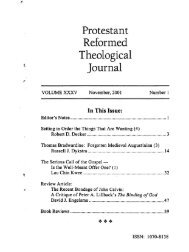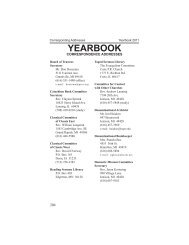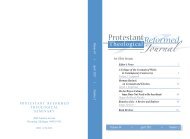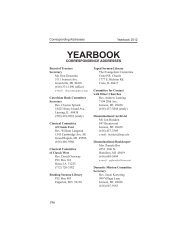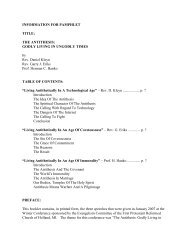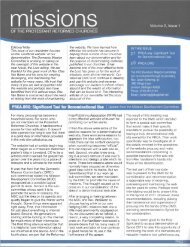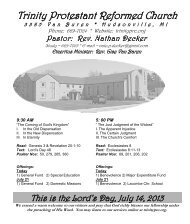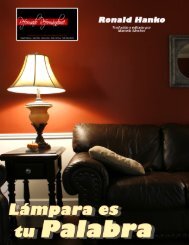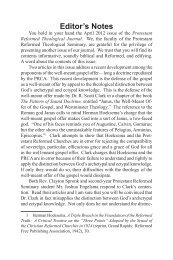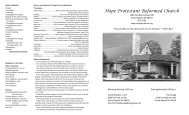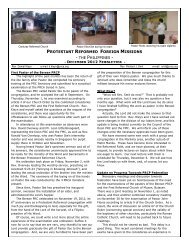November 2007 - Protestant Reformed Churches in America
November 2007 - Protestant Reformed Churches in America
November 2007 - Protestant Reformed Churches in America
Create successful ePaper yourself
Turn your PDF publications into a flip-book with our unique Google optimized e-Paper software.
<strong>Protestant</strong> <strong>Reformed</strong> Theological Journal<br />
believers. Notwithstand<strong>in</strong>g Perk<strong>in</strong>s’ good <strong>in</strong>tentions, it must be<br />
acknowledged that his doctr<strong>in</strong>e did tend to distress the consciences<br />
of the weak. How shall I know if the works of the Spirit I perceive<br />
to be <strong>in</strong> me are fruits of “preparation” or “compunction”<br />
If a reprobate can go a certa<strong>in</strong> distance along this preparatory path,<br />
how may I know that I am not a reprobate, fool<strong>in</strong>g myself <strong>in</strong>to<br />
believ<strong>in</strong>g that I am on the narrow way, when I could very well<br />
still be on the broad way that leads to destruction (Matt. 7:13) It<br />
was not Perk<strong>in</strong>s’ desire to distress the weak, but to awaken the<br />
presumptuous out of his carnal security. He, therefore, sought to<br />
encourage the s<strong>in</strong>ner who found the smallest sign of grace <strong>in</strong> himself<br />
to be of good courage. Perk<strong>in</strong>s writes that “the will to become<br />
regenerate … is the effect and testimony of regeneration<br />
begun.” 13 If a man can but desire regeneration he shows by this<br />
that he is already born aga<strong>in</strong> and is <strong>in</strong> a gracious condition. However,<br />
above we have seen that Perk<strong>in</strong>s fails to apply this pr<strong>in</strong>ciple<br />
with consistency, for “some weak and fa<strong>in</strong>t desire, some small<br />
obedience” may, if the spark of grace be allowed to go out, be<br />
evidence only of “counterfeit grace.” It must be conceded that<br />
this is better than some later theologians, who, as we shall see,<br />
taught that a s<strong>in</strong>ner can earnestly desire regeneration and yet rema<strong>in</strong><br />
unregenerate and perish. Others urged s<strong>in</strong>ners to pray to God<br />
for the grace of regeneration, but offered them little hope that<br />
their prayers would be answered. Perk<strong>in</strong>s, <strong>in</strong> contrast, taught (albeit<br />
<strong>in</strong>consistently) that the desires that a man has for faith may<br />
be viewed as the first signs of regeneration:<br />
Mark then … though as yet thou wantest [lackest] firm and lively<br />
grace, yet art thou not altogether void of grace, if thou canst unfeignedly<br />
desire it. Thy desire is the seed, conception or bud of that<br />
which thou wantest. ‘If any man thirst, let him come to me and dr<strong>in</strong>k.’ 14<br />
This certa<strong>in</strong>ly serves to neutralize some, although not all, of<br />
the poison conta<strong>in</strong>ed <strong>in</strong> Perk<strong>in</strong>s’ doctr<strong>in</strong>e of preparatory grace. It<br />
13. Pettit, The Heart, p. 62.<br />
14. Pettit, The Heart, p. 63.<br />
62<br />
Vol. 41, No. 1



